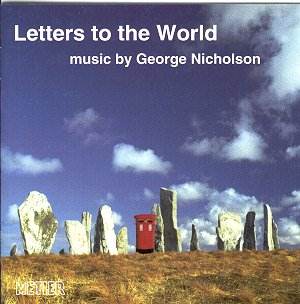LETTERS TO THE WORLD
Chamber Music of GEORGE NICHOLSON
Nodus (1978) for clarinet and piano
Spring Songs (1991)
Nots Justes for solo piano
Letters to the World
 John Turner, recorder; Peter
Lawson, piano; Philip Edwards, clarinet; Alison Wells, soprano, Keith Elcombe,
harpsichord; Jonathan Price, cello
John Turner, recorder; Peter
Lawson, piano; Philip Edwards, clarinet; Alison Wells, soprano, Keith Elcombe,
harpsichord; Jonathan Price, cello
Recorded : Manchester University, September 2000
 METIER MSV CD 92062
[79:27]
METIER MSV CD 92062
[79:27]
AmazonUK
AmazonUS
Amazon
recommendations

Though some of it has already been recorded (his Third String Quartet
[METIER MSV CD 92016] and his song cycle Peripheral Visions [METIER
MSV CD 92025]), George Nicholson's music is still too little-heard and recorded.
The present release, again from METIER, is thus the only one so far entirely
devoted to Nicholson's works. With the exception of Nodus
(1978), all other pieces here are fairly recent being written between
1988 and 1997.
Nodus (1978) for clarinet and piano is thus the earliest piece
in this collection. As suggested by the title ("knot" in Latin), the piece
is based on several different materials "pulled together so that their identities
gradually merge". The main ideas, a long clarinet line with piano harmonies
and what the composer refers to as vigorous coloratura passages, are stated
in the very first bars of the piece and developed during the course of the
piece. At the very end the "knot" threatens to snap altogether. This finely
wrought piece of music is a most welcome addition to the instrument's repertoire.
The recorder piece Spring Songs of 1991 was written for John
Turner. The composer sees it as a sequel to his earlier Winter Music
(clarinet, harp and percussion) written in 1978. However the composer
decided for a short suite for unaccompanied recorder alternating between
the reflective and the athletic and exploiting the various registers of the
instrument while avoiding most "tricks and gimmicks" of modern writing for
recorder. The recorder is allowed to sing and dance all the way through.
This short suite of colourful vignettes is a quite enjoyable work.
Between 1988 and 1997 Nicholson wrote a set of five inventions for piano
entitled Nots Justes. The three pieces here, the last three
of the set, are written in memory of some major jazz musicians though the
music largely avoids any direct reference to various jazz idioms. For
Miles, written in memory of Miles Davis, only alludes to some jazz
techniques. Song without Words, in memory of Ella Fitzgerald, is
appropriately mostly song-like. The last piece In accord ( in memory
of Gerry Mulligan) is by far the longest (it lasts about 13 minutes) and
the weightiest. It is also an introspective meditation based on deliberately
limited material. The resulting piece is a very fine example of Nicholson's
imagination and ability to develop a sustained argument. These pieces are
really impressive: tightly argued and beautifully written, and by no means
light music or blunt jazzy clichés. I wish the whole set had been
recorded. As might be expected, Peter Lawson's performances are just superb.
We are not told when Letters to the World was written, but
we may assume that it is a fairly recent piece. By all accounts, this is
also the most substantial piece here. It was written for the present performers
and is thus scored for soprano, recorder, cello and harpsichord. It sets
eleven poems by Emily Dickinson. The first poem Belshazzar had
a letter stands alone whereas the other ten poems are all paired according
to their subject matter. (The composer comments on Dickinson's habit of
revisiting some of her older poems.) Thus the entire sequence is quite varied
in mood and each song, meditating on mortality and immortality, the passing
of time, the wonders of nature, is appropriately characterised. The music
is in turn reflective and playful, dreamy and ironical, tender and sorrowful.
Most songs are fairly short though the sixth one, a long meditation on the
passing of Summer, is more developed and makes for the emotional climax of
the whole cycle. Letters to the World is really a magnificent piece
that may at first sound a bit austere (this may be due to the "baroque" lay-out
of the instrumental forces) but it vastly repays repeated hearings. I have
no hesitations whatsoever about this as being a major achievement in Nicholson's
output.
George Nicholson, born in 1949, studied at the University of York with David
Blake and Bernard Rands. His music, as heard here, is always beautifully
crafted, technically demanding, certainly not easy to play but eminently
accessible for the composer always sees to it that it communicates directly
by way of its invention, its imagination and its vitality.
This is, I must confess, my first contact with Nicholson's music of which
I now hope to hear more soon.
Hubert Culot

